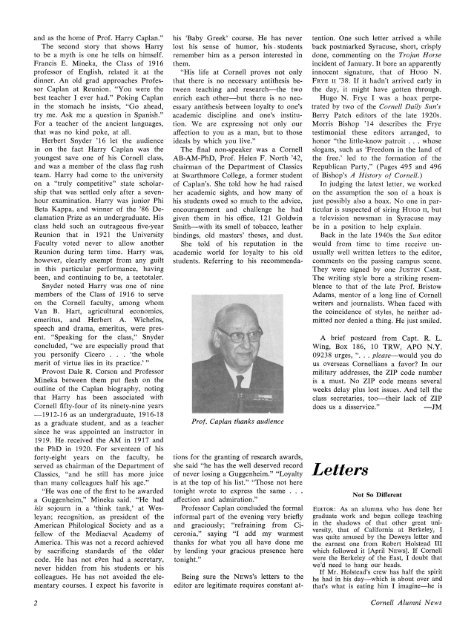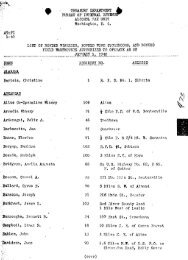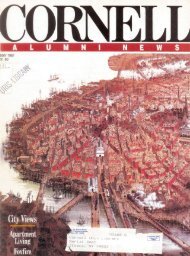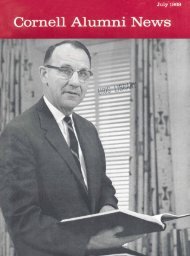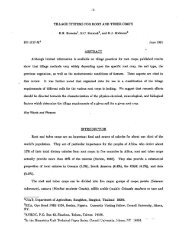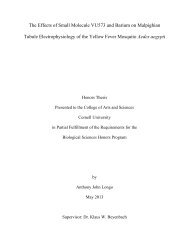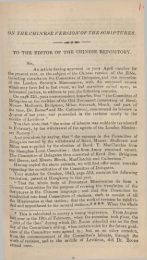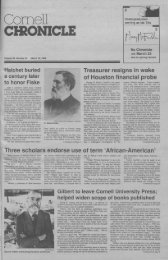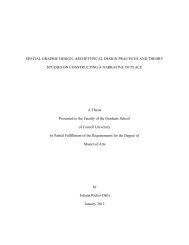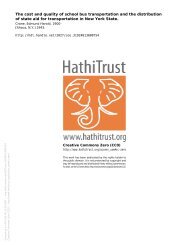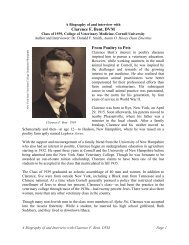Cornell Alumni News - eCommons@Cornell - Cornell University
Cornell Alumni News - eCommons@Cornell - Cornell University
Cornell Alumni News - eCommons@Cornell - Cornell University
You also want an ePaper? Increase the reach of your titles
YUMPU automatically turns print PDFs into web optimized ePapers that Google loves.
and as the home of Prof. Harry Caplan."<br />
The second story that shows Harry<br />
to be a myth is one he tells on himself.<br />
Francis E. Mineka, the Class of 1916<br />
professor of English, related it at the<br />
dinner. An old grad approaches Professor<br />
Caplan at Reunion. "You were the<br />
best teacher I ever had." Poking Caplan<br />
in the stomach he insists, "Go ahead,<br />
try me. Ask me a question in Spanish."<br />
For a teacher of the ancient languages,<br />
that was no kind poke, at all.<br />
Herbert Snyder '16 let the audience<br />
in on the fact Harry Caplan was the<br />
youngest save one of his <strong>Cornell</strong> class,<br />
and was a member of the class flag rush<br />
team. Harry had come to the university<br />
on a "truly competitive" state scholarship<br />
that was settled only after a sevenhour<br />
examination. Harry was junior Phi<br />
Beta Kappa, and winner of the '86 Declamation<br />
Prize as an undergraduate. His<br />
class held such an outrageous five-year<br />
Reunion that in 1921 the <strong>University</strong><br />
Faculty voted never to allow another<br />
Reunion during term time. Harry was,<br />
however, clearly exempt from any guilt<br />
in this particular performance, having<br />
been, and continuing to be, a teetotaler.<br />
Snyder noted Harry was one of nine<br />
members of the Class of 1916 to serve<br />
on the <strong>Cornell</strong> faculty, among whom<br />
Van B. Hart, agricultural economics,<br />
emeritus, and Herbert A. Wichelns,<br />
speech and drama, emeritus, were present.<br />
"Speaking for the class," Snyder<br />
concluded, "we are especially proud that<br />
you personify Cicero . . . 'the whole<br />
merit of virtue lies in its practice.' "<br />
Provost Dale R. Corson and Professor<br />
Mineka between them put flesh on the<br />
outline of the Caplan biography, noting<br />
that Harry has been associated with<br />
<strong>Cornell</strong> fifty-four of its ninety-nine years<br />
—1912-16 as an undergraduate, 1916-18<br />
as a graduate student, and as a teacher<br />
since he was appointed an instructor in<br />
1919. He.received the AM in 1917 and<br />
the PhD in 1920. For seventeen of his<br />
forty-eight years on the faculty, he<br />
served as chairman of the Department of<br />
Classics, "and he still has more juice<br />
than many colleagues half his age."<br />
"He was one of the first to be awarded<br />
a Guggenheim," Mineka said. "He had<br />
his sojourn in a 'think tank,' at Wesley<br />
an; recognition, as president of the<br />
American Philological Society and as a<br />
fellow of the Mediaeval Academy of<br />
America. This was not a record achieved<br />
by sacrificing standards of the older<br />
code. He has not even had a secretary,<br />
never hidden from his students or his<br />
colleagues. He has not avoided the elementary<br />
courses. I expect his favorite is<br />
his 'Baby Greek' course. He has never<br />
lost his sense of humor, his - students<br />
remember him as a person interested in<br />
them.<br />
"His life at <strong>Cornell</strong> proves not only<br />
that there is no necessary antithesis between<br />
teaching and research—the two<br />
enrich each other—but there is no necessary<br />
antithesis between loyalty to one's<br />
academic discipline and one's institution.<br />
We are expressing not only our<br />
affection to you as a man, but to those<br />
ideals by which you live."<br />
The final non-speaker was a <strong>Cornell</strong><br />
AB-AM-PhD, Prof. Helen F. North '42,<br />
chairman of the Department of Classics<br />
at Swarthmore College, a former student<br />
of Caplan's. She told how he had raised<br />
her academic sights, and how many of<br />
his students owed so much to the advice,<br />
encouragement and challenge he had<br />
given them in his office, 121 Goldwin<br />
Smith—with its smell of tobacco, leather<br />
bindings, old masters' theses, and dust.<br />
She told of his reputation in the<br />
academic world for loyalty to his old<br />
students. Referring to his recommenda-<br />
Prof. Caplan thanks audience<br />
tions for the granting of research awards,<br />
she said "he has the well deserved record<br />
of never losing a Guggenheim." "Loyalty<br />
is at the top of his list." "Those not here<br />
tonight wrote to express the same . . .<br />
affection and admiration."<br />
Professor Caplan concluded the formal<br />
informal part of the evening very briefly<br />
and graciously; "refraining from Ciceronia,"<br />
saying "I add my warmest<br />
thanks for what you all have done me<br />
by lending your gracious presence here<br />
tonight."<br />
Being sure the NEWS'S letters to the<br />
editor are legitimate requires constant attention.<br />
One such letter arrived a while<br />
back postmarked Syracuse, short, crisply<br />
done, commenting on the Trojan Horse<br />
incident of January. It bore an apparently<br />
innocent signature, that of HUGO N.<br />
FRYE π '38": If it hadn't arrived early in<br />
the day, it might have gotten through.<br />
Hugo N. Frye I was a hoax perpetrated<br />
by two of the <strong>Cornell</strong> Daily Sun's<br />
Berry Patch editors of the late 1920s.<br />
Morris Bishop '14 describes the Frye<br />
testimonial these editors arranged, to<br />
honor "the little-know patroit . . . whose<br />
slogans, such as 'Freedom in the land of<br />
the free.' led to the formation of the<br />
Republican Party," (Pages 495 and 496<br />
of Bishop's A History of <strong>Cornell</strong>.)<br />
In judging the latest letter, we worked<br />
on the assumption the son of a hoax is<br />
just possibly also a hoax. No one in particular<br />
is suspected of siring HUGO π, but<br />
a television newsman in Syracuse may<br />
be in a position to help explain.<br />
Back in the late 1940s the Sun editor<br />
would from time to time receive unusually<br />
well written letters to the editor,<br />
comments on the passing campus scene.<br />
They were signed by one JUSTIN CASE.<br />
The writing style bore a striking resemblence<br />
to that of the late Prof. Bristow<br />
Adams, mentor of a long line of <strong>Cornell</strong><br />
writers and journalists. When faced with<br />
the coincidence of styles, he neither admitted<br />
nor denied a thing. He just smiled.<br />
A brief postcard from Capt. R. L.<br />
Wing, Box 186, 10 TRW, APO N.Y.<br />
09238 urges, ". . . please—would you do<br />
us overseas <strong>Cornell</strong>ians a favor? In our<br />
military addresses, the ZIP code number<br />
is a must. No ZIP code means several<br />
weeks delay plus lost Issues. And tell the<br />
class secretaries, too—their lack of ZIP<br />
does us a disservice."<br />
—JM<br />
Letters<br />
Not So Different<br />
EDITOR: As an alumna who has done her<br />
graduate work and begun college teaching<br />
in the shadows of that other great university,<br />
that of California at Berkeley, I<br />
was quite amused by the Deweys letter and<br />
the earnest one from Robert Holstead III<br />
which followed it [April NEWS]. If <strong>Cornell</strong><br />
were the Berkeley of the East, I doubt that<br />
we'd need to hang our heads.<br />
If Mr. Holstead's crew has half the spirit<br />
he had in his day—which is about over and<br />
that's what is eating him I imagine—he is<br />
<strong>Cornell</strong> <strong>Alumni</strong> <strong>News</strong>


